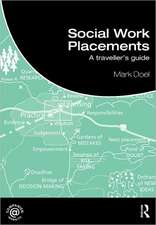Crossing Boundaries and Developing Alliances Through Group Work
Editat de Jocelyn Lindsay, Daniel Turcotte, Estelle Hopmeyeren Limba Engleză Hardback – 28 aug 2003
Crossing Boundaries and Developing Alliances Through Group Work examines how changing technological, economic, and social conditions require social workers to create alliances to better serve their clients. The book addresses how the basic principles and techniques of group work can transcend geographical and cultural boundaries when dealing with issues such as HIV/AIDS, parenting, adoption, and sex offenses. A distinguished panel of practitioners, researchers, and educators details the strategies used to establish cultural and linguistic “border crossings” that help reduce the limits social workers face.
Crossing Boundaries and Developing Alliances Through Group Work addresses the multicultural dimension of social work and the benefits of a junction between research and intervention, including how the convergence with other fields of knowledge (music, drama, the arts, etc.) can contribute to a more effective intervention methodology. The book examines partnerships between research teams and agencies, field placements, collaborations between schools and practice settings, building a learning community, service education, the arrival of new technologies (teleconferencing, the Internet), reasserting group work fundamentals, and how “mixing and matching” methodologies can produce a more effective intervention strategy.
Topics examined in Crossing Boundaries and Developing Alliances Through Group Work include:
- working with AIDS patients in early recovery from substance abuse
- integrating group work with mutual aid to treat male sex offenders
- using teleconferencing groups with families involved in organ donation
- conducting group interventions with mentally ill parents
- working with families dealing with failed adoptions
- developing a mediating group for birth parent self-assessment
- and much more!
Preț: 682.36 lei
Preț vechi: 915.32 lei
-25% Nou
Puncte Express: 1024
Preț estimativ în valută:
130.57€ • 136.69$ • 108.04£
130.57€ • 136.69$ • 108.04£
Carte tipărită la comandă
Livrare economică 05-19 aprilie
Preluare comenzi: 021 569.72.76
Specificații
ISBN-13: 9780789018496
ISBN-10: 0789018497
Pagini: 242
Dimensiuni: 148 x 210 x 225 mm
Greutate: 0.54 kg
Ediția:New.
Editura: Taylor & Francis
Colecția Routledge
Locul publicării:Oxford, United Kingdom
ISBN-10: 0789018497
Pagini: 242
Dimensiuni: 148 x 210 x 225 mm
Greutate: 0.54 kg
Ediția:New.
Editura: Taylor & Francis
Colecția Routledge
Locul publicării:Oxford, United Kingdom
Cuprins
- About the Editors
- Contributors
- Acknowledgments
- Introduction. Beyond Our Frontiers: The Development of Alliances Through Group Work (Jocelyn Lindsay, Daniel Turcotte, and Estelle Hopmeyer)
- Chapter 1. Towards an International Development of Group Work: Establishing Cultural and Linguistic Border Crossings
- Introduction
- Internationalizing Group Work
- Arriving at the Group Work Frontier
- The Cross-National Encounter
- From the “Inter” to the “Trans”-Cultural
- Chapter 2. Crossing Boundaries: Group Work with Persons with AIDS in Early Recovery from Substance Abuse
- Literature Review
- The Work
- The Authority Theme
- The Intimacy Theme: Helping Yourself by Helping Others
- Conclusion
- Chapter 3. Where Has Real Group Work Gone? Reasserting the Fundamentals
- What Has Happened to Group Work?
- How Should We Respond?
- Chapter 4. Group Field Consulting: Building a Learning Community
- Introduction
- Development of Supervision and Field Instruction in Social Work
- The Group Field-Consulting Model
- Conclusions
- Appendix: Field-Consulting Methodology and Outcomes
- Chapter 5. Night of the Tortured Souls: Integration of Group Therapy and Mutual Aid for Treated Male Sex Offenders
- Integrating Continued Therapy with Supervised Mutual Aid
- A Philosophy of Treating and Supporting the Treated
- Group Practice in Integrating Therapy and Mutual Aid with Treated Sex Offenders
- Conclusion
- Chapter 6. Pushing the Boundary and Coming Full Circle: A Contemporary Role for Social Group Work in Service Education
- Literature Review
- The Field Placement
- Effects of the Group Work Intervention
- Future Directions
- Appendix: Levels of Transcendence Identified in Group Interaction
- Chapter 7. The Use of Teleconferencing Focus Groups with Families Involved in Organ Donation: Dealing with Sensitive Topics
- Why Teleconferencing Focus Groups
- Dealing with Sensitive Topics
- Reactivity in the Screener Questionnaire
- Motivation of the Participants
- Moderators’ Self-Disclosure and Credibility
- Group Members’ Self-Disclosure
- Normalisation of Emotions
- Legitimization of Participant’s Comments
- Building on Preparation and Beginning the Focus Group
- Conclusion
- Chapter 8. Using Groups for Research and Action: The Asian Mothers’ Support Project
- The North Campus Outreach Project
- A Program and A Process for Change
- Programming
- Survey and Program Data
- Results
- Synergy Through Groups
- Summary
- Chapter 9. Families for Reunification: A Mediating Group Model for Birth Parent Self-Assessment
- Partners in Plan
- Program Development
- Program Design
- Analysis
- Conclusion
- Appendix: Families for Reunification—Partners in the Plan, Final Assessment
- Chapter 10. Efficacy of Group Interventions with Seriously Mentally Ill Parents: A Literature Review
- Introduction
- Definition of a Group
- The Population
- Seriously Mentally Ill Parents and Group Intervention
- Implications
- Conclusion
- Chapter 11. Post-Legal Adoption Treatment Groups: Intervening with Families Who Experience Failed Adoptions
- Introduction
- Adoption Disruption/Dissolution: Definitions and Overview
- Demographics of the Population Studied
- The Importance of Post-Legal Adoption Intervention
- Group Services
- Program Design
- Curriculum
- Outcome and Follow-Up
- Conclusions
- Index
- Reference Notes Included
Notă biografică
Jocelyn Lindsay, Daniel Turcotte, Estelle Hopmeyer
Descriere
Crossing Boundaries and Developing Alliances Through Group Work examines how changing technological, economic, and social conditions require social workers to create alliances to better serve their clients. The book addresses how the basic principles and techniques of group work can transcend geographical and cultural boundaries when dealing with issues such as HIV/AIDS, parenting, adoption, and sex offenses. A distinguished panel of practitioners, researchers, and educators details the strategies used to establish cultural and linguistic “border crossings” that help reduce the limits social workers face.










